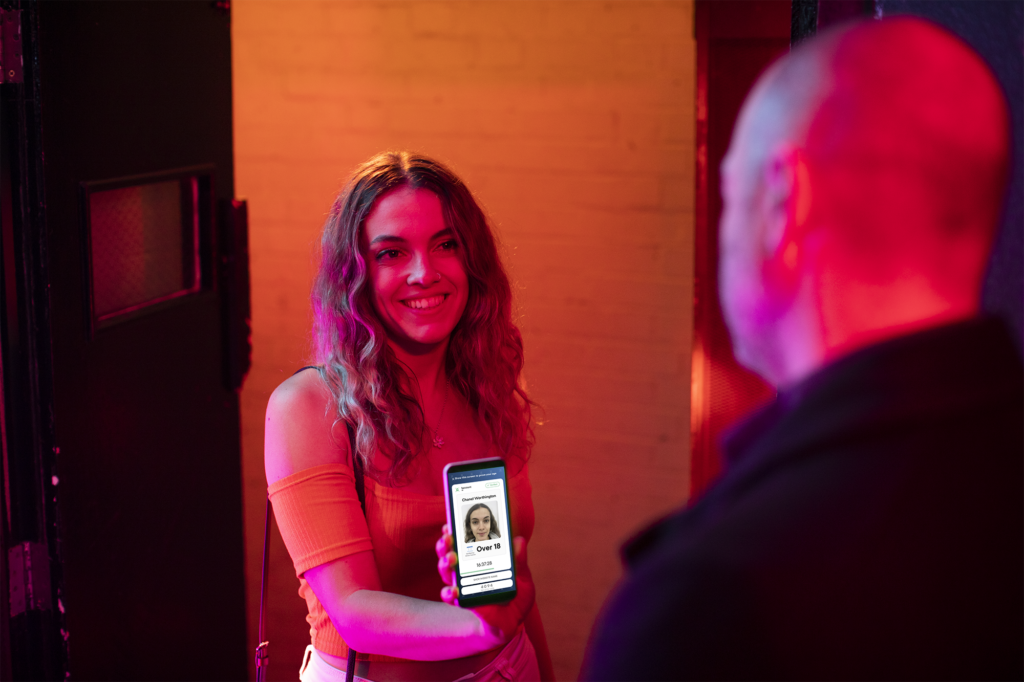Clubgoers love the sound of digital ID
A five-month Home Office trial of the digital ID app developed by 1account, a leading provider of age verification and digital ID technology, has shown overwhelming acceptance by clubgoers at REKOM UK’s Tru Camberley venue in Surrey.
For REKOM UK, the biggest late night club and bar operator in the country, the trial demonstrated that a digital age verification and identification process is more effective than physical ID for helping adults enter a venue in shorter time and assuring the venue that its guests are old enough to enjoy their night out. It also allows legal purchase of alcohol in a busy, low-lit environment.
Over the five-month trial of guests surveyed on their experience of using the 1account ID app, nearly nine out of ten found it easy to use and would prefer it to physical ID if given the choice.
Entry using the app averaged just 4.7 seconds, as against 14.8 seconds using physical ID scanning technology, which is a current requirement of Tru Camberley’s licence to sell alcohol.
The collaboration between the Home Office, REKOM UK and 1account set out to assess the use of digital identities in the nightclub sector. It was one of nine regulatory ‘sandbox’ trials conducted across England using different technologies and covering a range of alcohol retail environments.
Creating an ID takes just a few moments with the 1account app. The user scans a legitimate form of photo ID, usually a driving licence or passport, which is automatically checked for authenticity. A selfie is then compared to the ID document’s photo to ensure a match. If it meets strict guidelines, the user will be issued their own digital ID.
At the venue, guests simply hold their phones to a QR reader. The app scans the code and indicates on the smartphone screen if the person is verified or not – together with a time and date stamp to foil attempts at screenshots.
These QR codes are unique to each location and paired to a four-digit security code known only to the venue. When the QR is scanned, that security code also appears on the consumer’s digital ID, delivering an additional layer of protection.
Tru Camberley’s licence requires guests to use ID scanning technology for entry to the club but local policing does not allow use of digital ID alone. As a ‘sandbox’ trial, 1account was able to replicate certain features of this process, but tested its digital ID app in isolation from other programmes operating in the background.
1account and REKOM used ticketing to allow club-goers to experience digital ID within the nightclub environment while capturing useful data. The trial, which took place earlier this year, saw 921 downloads of the digital ID application and 790 successful registrations of digital IDs.
There were 839 unique check-ins by people presenting digital ID at the venue. Of these, 417 were repeat checks-ins by 141 individuals and 422 were individuals who used the digital ID once.
Of 288 guests at Tru Camberley who were surveyed on their experience of using the technology, 88.5% found the digital ID app easy to use. From the same group surveyed, 89.6% stated a preference for the use of digital ID over physical ID where that would be made available. That indicated a strong acceptance of digital ID and preference for digital ID among younger people in the night-time economy.
A key consideration that emerged from the trial was how much reliance was placed on the physical ID technology for ‘incident management’. 1account and REKOM showed how a digital ID dashboard could provide access to information on guests within the venue on the night of an incident, subject to GDPR.
REKOM UK’s Senior Operational Director, Tony Gorbert, noted: “Our guests are digital natives, so we are always looking for new ways to use technology to enhance our guest experience. We were pleased to take part in this Home Office initiative with 1account and the results have proved extremely positive where digital ID has been used by clubgoers. We will now assess the results and look to see how it can bring benefits to our guests in the future.”
Ben Keirle, Chief Executive at 1account, added: “The use of physical IDs in the nightclub environment poses challenges including: the use of fake documents and the ability to adequately check documents in a busy, low-lit environment, increasing the risk of underage access to nightclubs; and their limited ability to demonstrate that licensing conditions have fully been met with respect to underage access and consequent underage purchasing of alcohol. They are also extremely limited in providing intelligence on who is in a club in the event of disorder.
“REKOM estimates that approximately 18,000 physical ID documents are lost across their estate each year. When a physical ID is lost, none of the data is protected; it’s visible for anyone to see.
“While the nightclub will attempt to reunite lost documents with owners, the risk of permanent loss, potential significant inconvenience, risk of fraud, and cost of replacement remains. When a mobile phone is lost, it is invariably password or otherwise protected, making access to the data it holds extremely difficult. Consequently, the risk of misuse of that data remains low and therefore a mobile digital app presents significant benefits for clubgoers and operators.”
By the end of this year 1account has set itself a target of 60,000 locations that accept its digital ID solution and for two million customers to have downloaded and be using the app.




